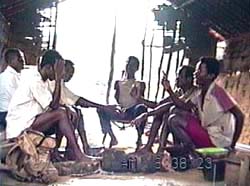| 2. A village full of human voices While I was in Zaire, I lived in a house that had been built for me in one of the equatorial Bongando villages, Yalisanga. At first, I thought I would be able to work quietly if I stayed in my own house. However, my plan proved to be mistaken; outside voices freely intruded in the house. The local people I hired were always around the house and so were their voices. Not only did their voices carry well, but they also floated incessantly. Since I was assigning them to carry out tasks, I hesitated to ask them to be quiet. I made a desperate effort to drown out the voices by listening to a headphone stereo. On one occasion, when I had a fever, I closed all the windows in the house and stayed in bed because I wanted to remain alone. Even then, I could hear people's repeated scream, “The bondele (meaning white in Bongando language) is sleeping!” Though I stayed in bed, I could not help murmuring “please do leave me alone.”
To what extent can the villagers hear the background utterances? In fact, they seem to understand the contents surprisingly well, far more than what Japanese can. The reason is that their language is a tone-oriented one. Words with the same spellings can have different meanings depending on their tones. In addition to verbal talk, they can communicate with each other amazingly fluently using talking drums, or even whistles made with their fingers and palms, manipulating the high and low tones. Therefore, even when a faint voice floats in from afar, if they can distinguish the tones and put them into the context of the conversation, they seem to be able to grasp a significant potion of what it means. KIMURA Daiji |
